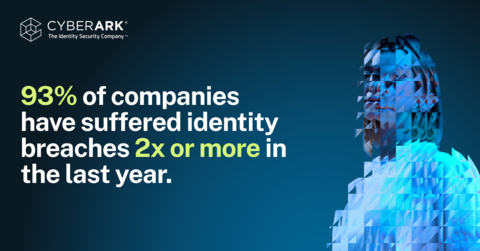Report: 93% Of Organizations Had Two or More Identity-Related Breaches in the Past Year
- Machine identities are the #1 driver of identity growth
-
Only
38% of organizations define all human and machine identities with sensitive access as privileged users -
70% + of security professionals are confident that their employees can identify deepfakes of their organizational leadership

The CyberArk Identity Security Threat Landscape 2024 Report (Graphic: Business Wire)
Cyber Risk Rises as Machine Identity Security Treated Differently to Humans
While the quantity of both human and machine identities is growing quickly, the report found that security professionals rate machines as the riskiest identity type. In part due to widespread adoption of multi-cloud strategies and growing utilization of AI-related programs like Large Language Models, machine identities are being created in vast numbers. Many of these identities require sensitive or privileged access. However, contrary to how human access to sensitive data is managed, machine identities often lack identity security controls, and therefore represent a widespread and potent threat vector ready to be exploited.
-
93% of organizations had two or more identity-related breaches in the past year. - Machine identities are the #1 cause of identity growth and are considered by respondents to be the riskiest identity type.
-
50% of organizations expect identities to grow 3x in the next 12 months (average: 2.4x). -
61% of organizations define a privileged user as human-only. Only38% of organizations define all human and machine identities with sensitive access as privileged users. -
In the next 12 months,
84% of organizations will use three or more Cloud Service Providers (CSPs).
Widespread Use of AI to Battle AI and Complacency Takes Hold
Consistent with our 2023 report, the 2024 Threat Landscape Report found that nearly all (
-
99% of organizations have adopted AI-powered tools as part of their cyber defenses. -
93% of respondents expect AI-powered tools to create cyber risk for their organization in the coming year. -
70% + are confident that their employees can identify deepfakes of their organizational leadership. - Nine out of 10 organizations have been a victim of a successful identity-related breach due to a phishing or vishing attack.
“Digital initiatives to drive organizations forward inevitably create a plethora of human and machine identities, many of which have sensitive access and all of which must have identity security controls applied to them in order to guard against identity-centric breaches,” said Matt Cohen, chief executive officer, CyberArk. “The report shows that identity breaches have affected nearly all organizations - multiple times in nearly all cases – and demonstrates that siloed, legacy solutions are ineffective at solving today’s problems. To stay ahead a paradigm shift is required, where resilience is built around a new cybersecurity model that places identity security at its core.”
Read the full report for further insight on what is behind human and machine identity growth, where related cyber risk lies and how AI is being used in cyber defenses. The report also details the consequences firms are facing from identity-centric cyber breaches and recommends methods of ensuring security practices keep up with wider organizational initiatives to reduce cybersecurity debt.
About the Report
The CyberArk 2024 Identity Security Threat Landscape Report was conducted across private and public sector organizations of 500 employees and above. It was conducted by market researchers Vanson Bourne amongst 2,400 cybersecurity decision makers. Respondents were based in
About CyberArk
CyberArk (NASDAQ: CYBR) is the global leader in identity security. Centered on intelligent privilege controls, CyberArk provides the most comprehensive security offering for any identity – human or machine – across business applications, distributed workforces, hybrid cloud environments and throughout the DevOps lifecycle. The world’s leading organizations trust CyberArk to help secure their most critical assets. To learn more about CyberArk, visit https://www.cyberark.com, read the CyberArk blogs or follow on LinkedIn, X, Facebook or YouTube.
View source version on businesswire.com: https://www.businesswire.com/news/home/20240516898054/en/
Media:
Carissa Ryan
Press@cyberark.com
Investors:
Erica Smith
IR@cyberark.com
Source: CyberArk







